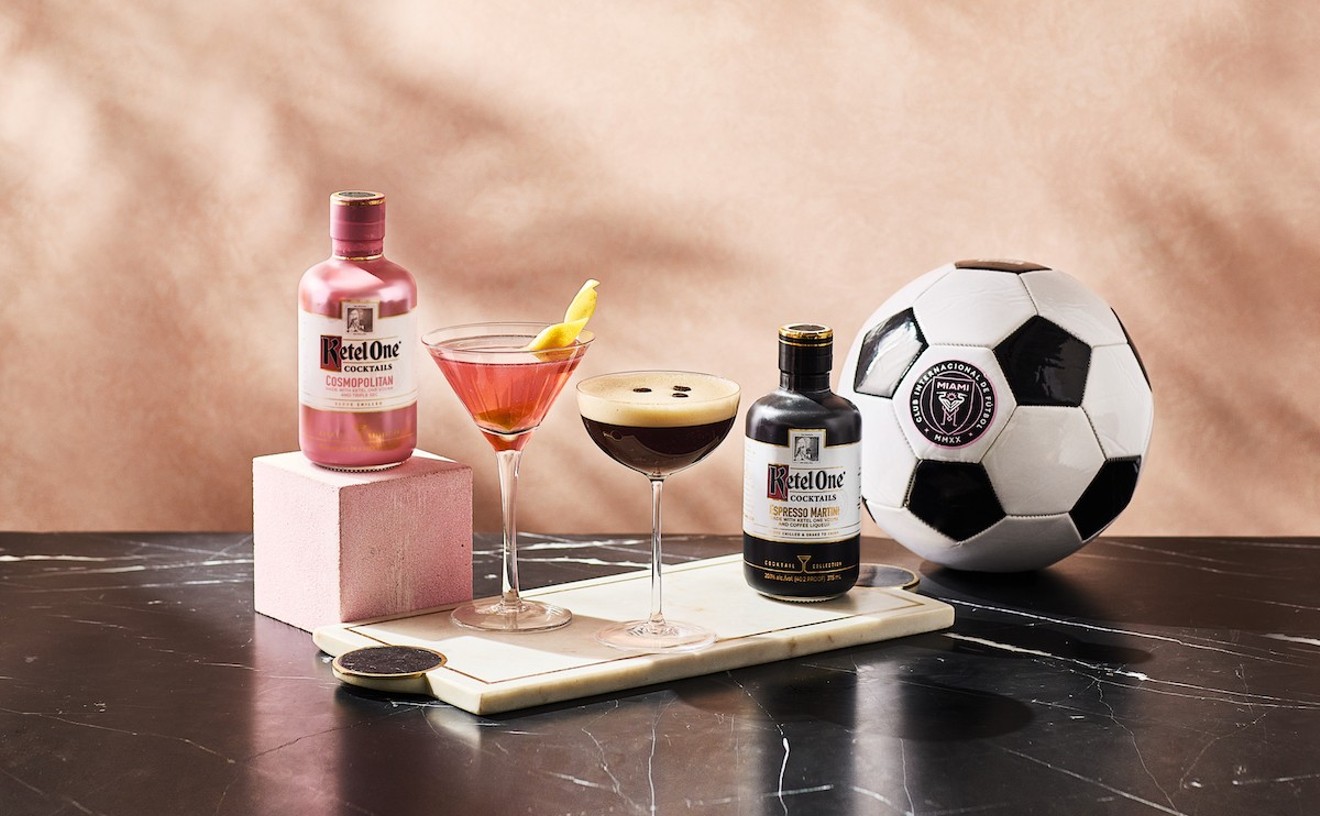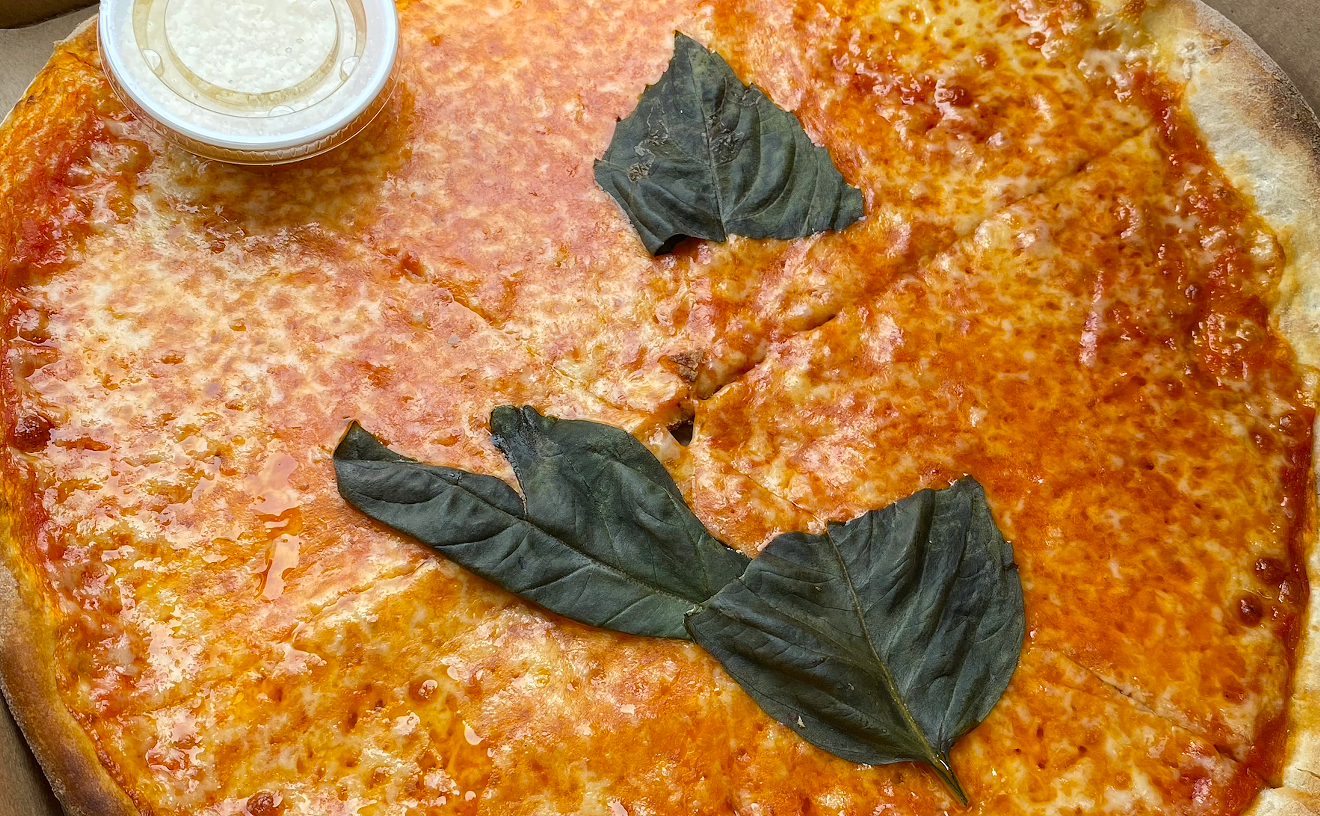At Au-Bar, everybody from the owner to the strolling flamenco guitarist seems dedicated to becoming the retail equivalent of a fruit fly: ever-present, irritatingly persistent, but paradoxically hard to snag when you need something like a refill of iced tea. On the night we visited, even the valet parking attendant asked us -- twice -- if we'd enjoyed ourselves. "How was the meal, folks?" as he took our ticket and strolled away to fetch our car. "How was the meal, folks?" when he pulled the car up scant seconds later.
OK, so he's a bit short on listening skills, which might be why he's relegated to the parking lot. But truly the double questioning wouldn't have been quite so annoying if it hadn't followed on the heels of similar queries from proprietor Tom Russo, the server, the busboy, the hostess, and even strangers lingering at the bar, not only on our way out the door but throughout the meal. Afterward, we estimated that we'd averaged four inquiries per course -- all having nothing to do with service, BTW. Add to that the quality of those conversations, which had a cocky edge and went something like:
Russo: "How're the appetizers?"
Us: "Really good."
Russo: "You mean great, right?"
Of course Au-Bar personnel have every reason to be concerned, even pathologically anxious. The restaurant has taken over one of those seemingly jinxed locations at the edge of Lighthouse Point, or LHP as the residents call it. Au-Bar's immediate predecessor, the Osprey, was awful -- the food tasted as if it had been cooked in the dishwasher. The failure of a half-dozen other eateries before it has left locals frustrated and anxious to find a watering hole of their own. LHP'ers, in turn, bring their own requirements to Au-Bar, which have something to do with cuisine but more to do with when and where they can really let loose. (And loose LHP'ers can be quite a raucous crowd.)
Put the fear of failing gastronomically and the need to placate the neighbors together. Is it any wonder that Au-Bar's staff is a bunch of table-hopping brownnosers?
For the record I hope Au-Bar's current personality profile evolves into something just a touch less Cable Guy, because Russo has already done some good things to distance himself from The Osprey. He "hired a coupla Cubans from Miami," he told us, to lay down a tile floor in keeping with the Mediterranean feel of Au-Bar and installed some faux arches to break up what was essentially one large dining room. His fiancée decorated an enormous banyan tree adjacent to the front door with strings of flowers and spotlights; the window-side table looking out on this tree provides the prettiest seats in the house. And while the peripatetic guitarist, miked to a fault and capable of singing Elvis songs in the finest Spanish tradition, isn't to my taste, he does provide a certain élan to which LHP'ers, at least, are already responding.
Certainly the proprietor's brightest move was to hire chef Jean S. Bailly. Inventive and fond of bold spicing, Bailly is a veteran of NYC eateries like Matthew's, where chef-proprietor Matthew Kenny was his mentor, as well as Banana Café and Bar Anise. His current menu at Au-Bar doesn't delineate Mediterranean countries (this dish comes from France, this dish comes from Spain, and oh, here's one from Morocco) but actually melds the European flavors with North African ones. For instance, a huge white bowl of al dente mushroom tortellini, dressed with a dark, woodsy sauce, featured green peas and lima beans. Beet risotto, a splendidly prepared rich dish that had been colored a vibrant red with puréed beets, was topped with a lovely, if somewhat diminutive, North African lobster tail. It's more infusion than fusion. Indeed, Bailly says, "I'm not trying to be different. I just love peasant food, rustic mountain-style food. I want you to be able to taste the spices, smell the aromatics."
The restaurant's fare, however, is anything but simple, unless it's simply delicious. Diners get standout dishes like a New York strip steak au poivre in which the juicy steak had been crusted with peppercorns, then smothered in a cream-touched rum sauce featuring plenty of garlic-studded cremini mushrooms. Sautéed broccoli rabe, a side dish to the steak, and oven-roasted potatoes that had been drizzled with olive oil and rosemary added complexity. Other winners included a main course of tender roasted duck, paired with a smoked-eggplant polenta cake and perfumed with dates, ginger, and saffron, and slightly simpler entrées like the Dijon mustarddill-scented baked salmon, which was unquestionably fresh and featured a crisp edge and moist interior. The salmon had been placed over a risotto-vegetable cake that offered a host of flavors in every bite and was garnished with braised fennel and sun-dried tomatoes.
One of Bailly's faults may be that he's a little too creative, a little too enamored of spices that are best utilized sparingly. Virtual trees of herbs decorated every plate, and anise -- a licorice-flavored spice -- appeared in everything from the tuna cakes to the crème brûlée. The tuna cakes, a special that evening, were an intriguing departure from crabcakes, which are a regular on the menu. And the tuna itself, both in chunks and minced, was tender inside a golden brown crust. But the dish ultimately failed because its flavors were too disparate (along with the anise, lemongrass was a huge presence) and seemed to offer a different intensity of flavor in every bite. The crème brûlée, on the other hand, tasted more like ginger than anise, which pleased us. However, the hot and cold spots in the custard were a dismaying factor.
Other items suffered from neglect. A white endive salad -- chopped Belgian endive with quartered dried apricots and a lemon-basil dressing -- was supposed to contain Cabrales blue cheese from Spain. It arrived sans cheese, though; a pity, since the salad really needed that musky bite to liven it up. Vichyssoise, the soup of the day, was poured elegantly into a specialty-coffee glass. But the famed chilled soup was served at a temperature above that of the room and had very little texture or flavor to recommend it. As for a slice of chocolate cake with espresso whipped cream, it was stale and freezer-burned.
Time will resolve some of Au-Bar's problems, like the overattentiveness. Missing ingredients will cease to happen as the kitchen becomes busier and lays in more regular stock. And the staff does seem to know the food (thanks to a tasting they had, the bartender informed us), if not how to pronounce it -- our server took the bluffer's way through "vichyssoise," ending up with something that sounded like "vu juice."
But more extensive training is required here. Short of sending the staff to charm school, Russo can trick them out in something a trifle more modish than the Au-Bar T-shirts they currently wear. He can instruct his hosts to seat customers at more inviting tables than the one hidden behind a palm tree and sandwiched between the kitchen door and the wait station, especially when the house is half empty. He can keep his servers from sharing too much information, such as why we couldn't get a cappuccino: "The button on the machine got stuck, and there was this big flood in the kitchen." He can also prevent them from making observations more suited to a dive bar, like "You got no more wine. Want another six bottles?" The name Au-Bar is meant to recall the chic Riviera with all its relative urbanities, and the stylish menu is supposed to follow through with pan-Mediterranean appeal. In the end the only thing that might keep Au-Bar from really making it is the service, now less "south of France" than "south of Bronx."










